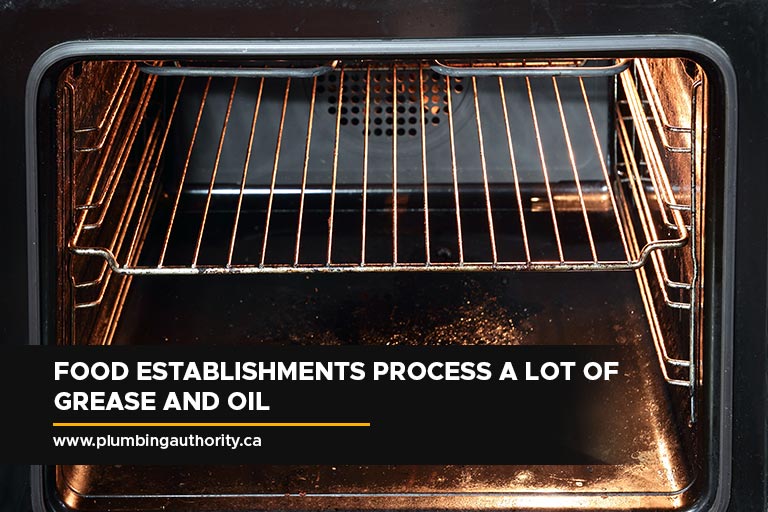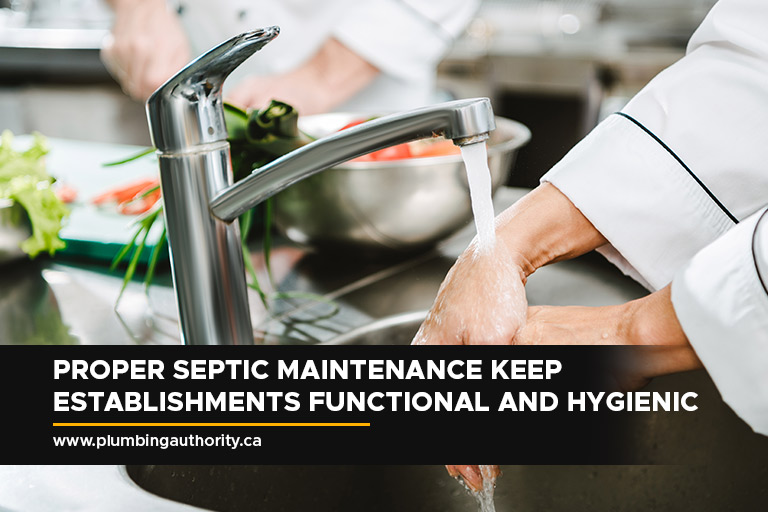
Owning a commercial business in Lisle is a significant investment, and protecting that investment goes beyond the typical concerns of marketing, sales, and staffing. One often-overlooked aspect is proper septic system maintenance. While it may not be the most glamorous topic, routine septic tank pumping is non-negotiable. It safeguards the health of your employees and customers, protects your property from messy mishaps, and saves you significant money in the long run.
If the “out of sight, out of mind” mentality applies to your commercial septic tank, this article is for you! Let’s dive into the unique challenges commercial septic systems face, the far-reaching benefits of regular pumping, and answer your burning questions about maintenance frequency.
Common Septic Tank Challenges Businesses Face

Food establishments process a lot of grease and oil
Commercial establishments create greater strain on septic systems compared to residential use, which can lead to specific problems:
- High Usage: Businesses often have significantly higher wastewater volumes compared to residential properties. This can include frequent bathroom use by employees and customers, kitchen wastewater from dishwashing and food preparation, and wastewater from cleaning or specialized equipment in businesses like car washes, salons, or healthcare facilities. The constant flow of higher volumes puts a strain on the septic tank’s capacity to process waste effectively, making regular pumping even more critical for commercial establishments.
- Grease and Fats: Restaurants, food processing facilities, and other businesses that generate large amounts of grease and fats pose a particular challenge to septic systems. These substances don’t break down easily within the tank and can solidify, forming clogs in the drain field and slowing down the natural breakdown process of waste. Regular pumping helps remove grease and fat accumulation before they cause problems.
- Non-Flushable Items: In busy commercial environments, the chance of non-flushable items like sanitary products, paper towels, or disposable wipes finding their way into the septic system is unfortunately higher. These items don’t break down like toilet paper and can quickly create blockages and backups in the system. Educating staff and customers about what not to flush is important, but regular pumping also helps prevent these blockages from causing major issues.
- Chemicals: Laundromats, salons, auto shops, and other businesses frequently use harsh chemicals in their cleaning and operational processes. These chemicals can disrupt the delicate balance of bacteria within the septic tank, hindering the breakdown of waste and potentially shortening the lifespan of the system. Regular pumping helps remove these chemicals before they can cause significant damage.
- Large Septic Tanks: While large tanks offer a larger capacity to handle commercial wastewater volumes, they can also create a false sense of security. A larger tank may take longer to fill up and show signs of needing pumping, but this can also mean that problems go undetected for longer periods. Regular inspections and pumping, even for large tanks, are crucial to prevent undetected issues from worsening over time.
- Tree Roots: Overgrown trees near commercial septic systems can have roots intruding on pipes, causing blockages and damage. Tree root invasions are a persistent problem that can require professional attention. Regular inspections by a septic professional can help identify and address tree root problems early on before they cause significant damage.
- Soil Conditions: The composition of the soil in Lisle can influence how well your septic system functions. Clay-heavy soil can impact drainage and may require a different septic system design or more frequent pumping compared to sandy soils. A licensed septic professional can evaluate your specific property and soil conditions to determine the best maintenance plan for your system.
Benefits of Commercial Septic Tank Pumping

Proper septic maintenance keep establishments functional and hygienic
Regular septic tank pumping isn’t just about fixing existing problems; think of it as a preventative investment with a wide array of advantages:
- Prevents Backups and Overflows: Septic tanks have a limited capacity. Neglecting pumping allows accumulated waste to overflow, forcing raw sewage back into your building or surfacing on your property. This creates a disgusting mess, potential health hazards, and forces temporary closure, disrupting your business.
- Extends Septic System Lifespan: Over time, sludge builds up on the tank’s bottom, and scum floats to the top. Excessive waste buildup limits the space available for proper wastewater breakdown and can clog the outlet pipes leading to the drain field. This overloads the entire system, potentially leading to failure and costly replacement.
- Protects Groundwater: Untreated wastewater from an overflowing septic tank can seep into the groundwater. This contaminated water poses serious health risks to anyone relying on wells for drinking water and can harm the delicate ecosystem Lisle depends on.
- Reduces Emergency Repairs Routine pumping isn’t just about emptying the tank; trained technicians look for minor problems like small cracks, leaks, or early signs of drain field problems. Catching these issues early allows for less expensive repairs, preventing them from snowballing into full-blown septic failures.
- Protects Property Value: A poorly maintained septic system can significantly impact a property’s value. Potential buyers and inspectors will be wary of a system with an unknown maintenance history. Regular pumping provides documented proof of responsible ownership, increasing your property’s appeal.
- Maintains Workplace Hygiene: Nobody wants to deal with foul sewage odours, overflowing toilets, or slow drains. A neglected septic system negatively impacts the work environment, affecting employees and potentially discouraging customers from returning, costing you business.
- Compliance with Regulations: Lisle has ordinances in place governing septic system maintenance. These regulations aim to protect public health and the environment. Regular pumping demonstrates your commitment to following the law and avoids the potential for costly fines or penalties.
- Peace of Mind: Knowing you have a team of professionals regularly inspecting and maintaining your septic system is invaluable. You can confidently focus on your core business operations without the constant worry of septic system failure.
How Often Should Lisle Businesses Pump Their Septic Tanks?
The Ontario Regulation 332/12 – Building Code states that “Septic tanks and other treatment units shall be cleaned whenever sludge and scum occupy 1/3 of the working capacity of the tank.” The recommended pumping frequency for a commercial establishment in Lisle depends on several factors:
- Septic tank size
- Type of business and the nature of its wastewater
- Number of employees and customers
- Regulatory requirements
Commercial establishments often require more frequent pumping than residential properties. To get a tailored maintenance plan, consulting a licensed septic professional for an evaluation is essential.
Don’t gamble with your Lisle business’s functionality and reputation. A malfunctioning septic system isn’t a minor inconvenience – it’s a direct threat to your daily operations. Sewage backups can force a business to close temporarily, damaging your reputation with customers and potentially leading to lost revenue and negative reviews.
Safeguard your investment and ensure a smooth-running business with reliable septic tank pumping from Plumbing Authority. Contact us today at (647) 992-7473.




